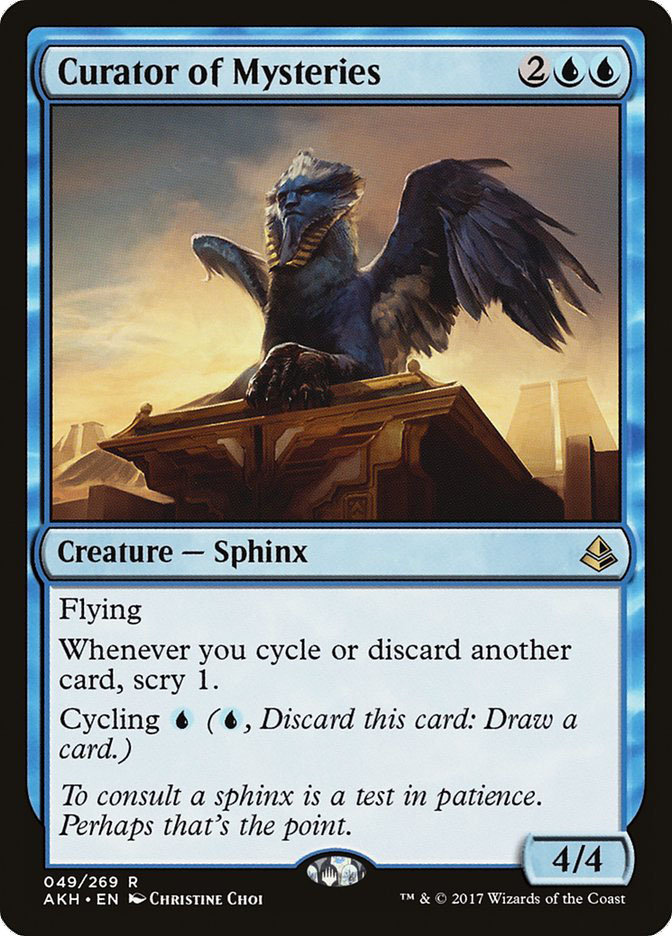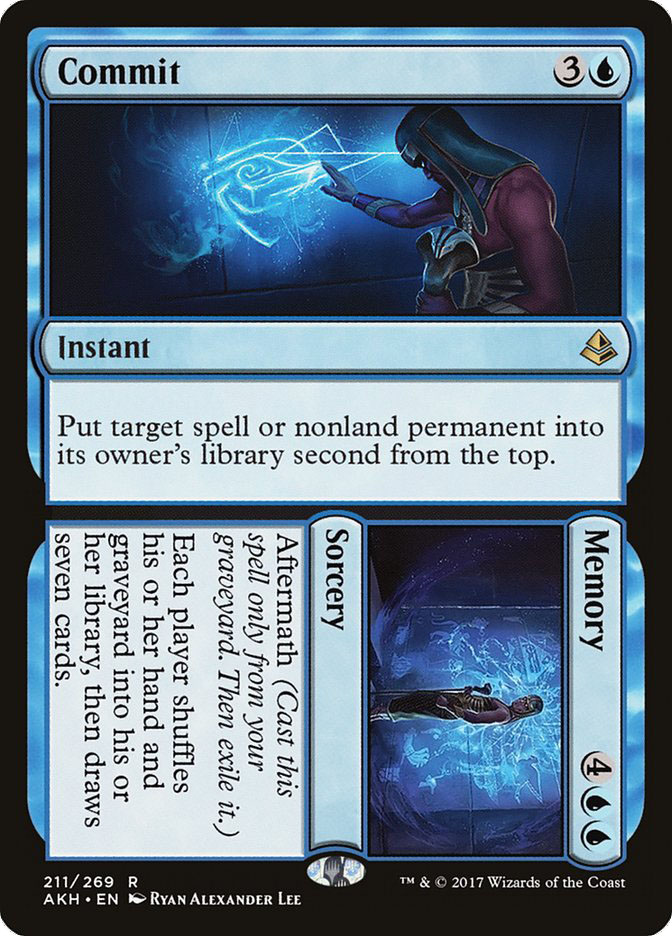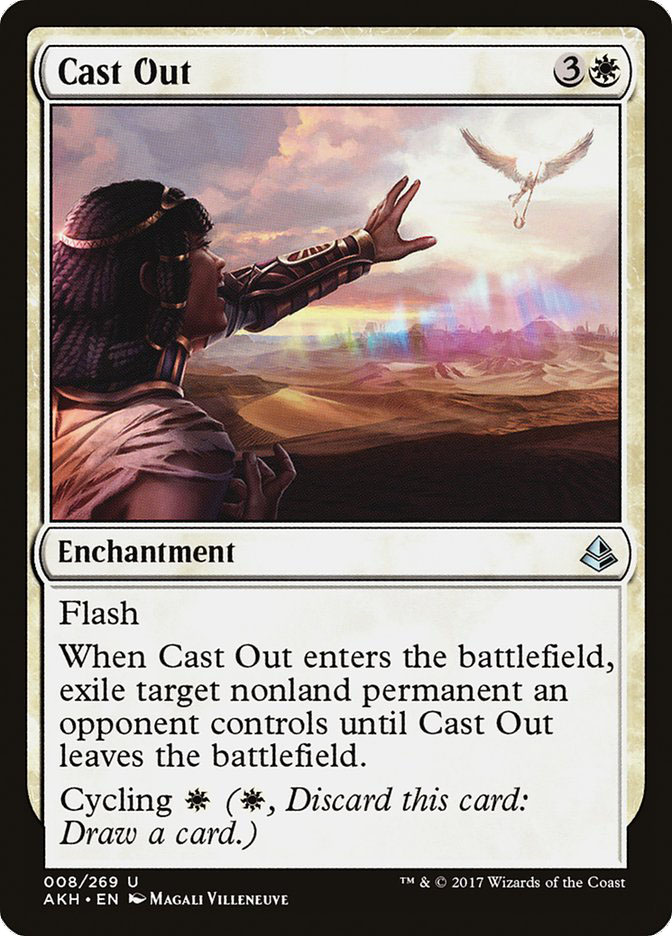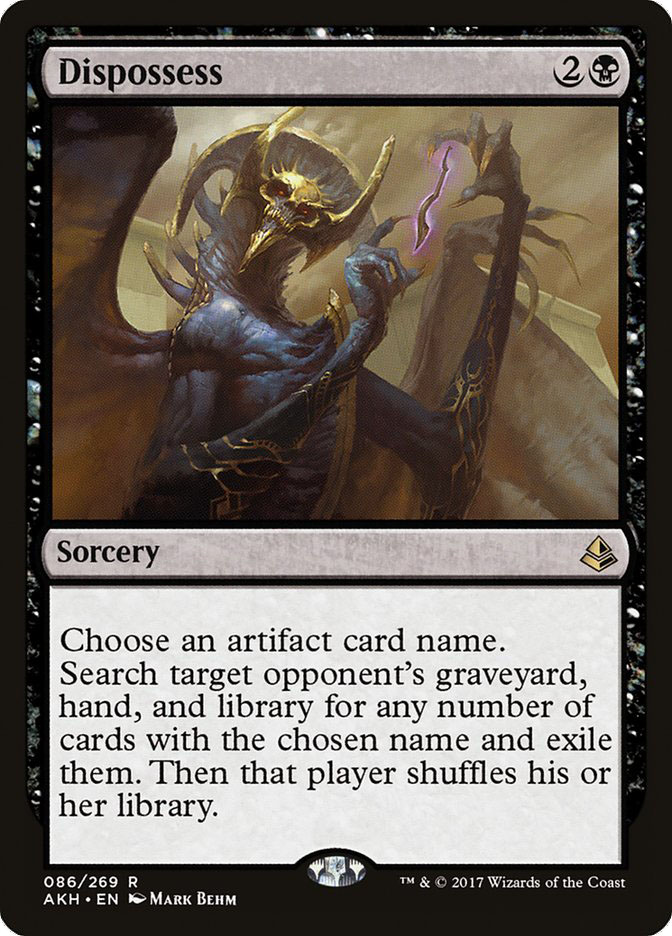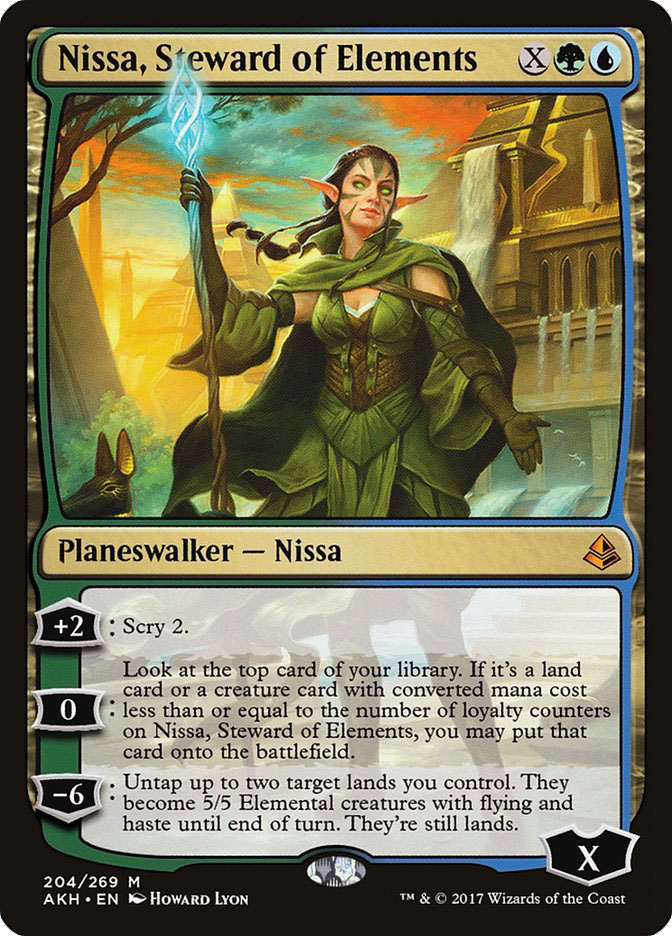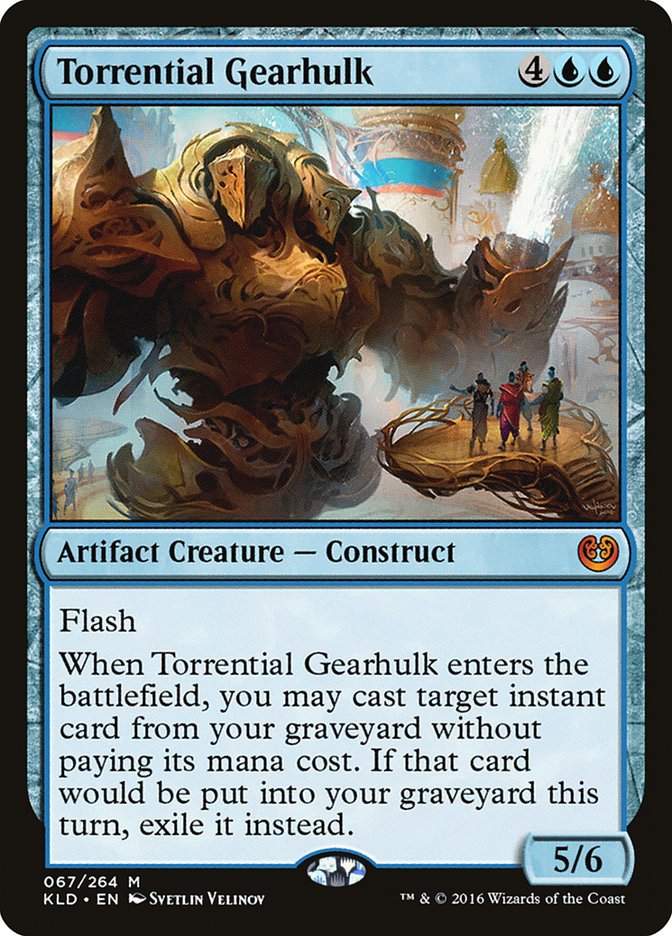So far, Delirium decks in Standard have had to play cards like Vessel of Nascency or Grapple with the Past in order to get enough different card types in their graveyard to reliably hit delirium. I believe Amonkhet changes all that and opens us up to a variety of new ways to build decks that take advantage of cards like Ishkanah, Grafwidow and Traverse the Ulvenwald.
Sultai Delirium Control
Let me demonstrate with my first list, a Delirium deck with no self-mill outside of a couple of Lilianas:
Creatures (9)
- 1 Kalitas, Traitor of Ghet
- 1 Ishkanah, Grafwidow
- 3 Torrential Gearhulk
- 1 Walking Ballista
- 1 Archfiend of Ifnir
- 2 Curator of Mysteries
Planeswalkers (2)
Lands (24)
Spells (25)

This deck is trying to function primarily as an instant-speed control deck, which should make getting Delirium fairly difficult, since it wants to play a lot of instants. The trick is that, by using cycling and Aftermath cards, we can put cards of a variety of types in the graveyard at instant speed. Let’s break this down by card type to see how difficult it is to get delirium:
Land:
Sorcery:
1 Never//Return
3 Commit//Memory
Creature:
Enchantment:
These are the cards that either cost less than three mana on my turn or allow me to spend mana at the end of my opponent’s turn to put these types in the graveyard. From among them, I should need to get three different types, because I should essentially always have an instant in my graveyard by the time I want to use delirium.
The cycling lands complement Evolving Wilds to make it much easier to get a land in the graveyard than it used to be, which helps a lot.
Curator of Mysteries and Lay Claim are great ways to get unusual types in the graveyard. It’s very rare that you’ll want to cast Curator of Mysteries, but it’s extremely cheap to cycle and it can be returned by either Liliana. Given how few creatures there are that easily end up in the graveyard early and how much easier it is to hit delirium with them, I think it’s very possible that this deck should have more copies of Curator of Mystery. Lay Claim offers an even less common type, but it costs twice as much to cycle. If I were just using it for the card type, it wouldn’t be worth the two mana, but as it happens, Lay Claim is actually a fantastic card to have access to, primarily because it’s an incredible answer to planeswalkers.
The last major key piece of the delirium puzzle is Commit//Memory. In the games I’ve played so far, I’ve loved this card. It’s slightly expensive, but it answers anything. Any spell, any permanent? That’s an absurd amount of flexibility. It’s not quite Hero’s Downfall when it comes to answering planeswalkers, but it does let you get them off the battlefield and gives you plenty of time to find an answer.
Memory isn’t a great fit for a control deck that’s using its graveyard, but I might play Commit by itself, especially if it just said that it also counts as a sorcery in the graveyard, but while Memory might not be part of plan A, it’s a great tool to have access to; even when it’s bad, it can still offer a swingy desperation measure for when you just need the game to be different. On top of that, it’s pretty awesome that you can use Torrential Gearhulk to cast Memory at the end of your opponent’s turn, allowing you to be the first one to untap with the new hand, which can easily make all the difference. While it may break delirium, you might find that you’re heavily favored when you both have a fresh hand but you start with a lot of lands on the battlefield, as there’s a good chance you can use more mana than your opponent at that stage of the game.
The sideboard offers fairly standard control options: extra counterspells against midrange and control decks, and cheap answers against aggressive decks. Fatal Push is the best in the business against cheap attackers, so it’s easy to want access to four of them. Gifted Aetherborn is a good answer to small ground creatures, especially if you expect your opponent to cut their cheap removal, and it also helps put an unusual card type in your graveyard while bolstering your life total.
Abzan Delirium
Apart from cycling lands, there’s a good chance that we’ll find the single biggest boon to Delirium to be Cast Out (which is likely even an important tool for Modern Delirium decks). With the addition of Scattered Groves, another card that can make it much easier to get delirium, there’s a good chance that G/B Delirium decks should look to splash white moving forward:
Creatures (14)
- 1 Mindwrack Demon
- 2 Tireless Tracker
- 3 Ishkanah, Grafwidow
- 4 Grim Flayer
- 1 Noxious Gearhulk
- 1 Walking Ballista
- 1 Archfiend of Ifnir
- 1 Manglehorn
Planeswalkers (5)
Lands (23)
Spells (18)

While Emrakul, the Promised End isn’t available anymore, this deck has picked up another powerful finisher in Liliana, Death’s Majesty.
We’ve primarily seen G/B decks move toward Winding Constrictor-based strategies, but as those were fairly unsuccessful at the end of the last format and didn’t gain any new tools (because Amonkhet features -1/-1 counters instead of +1/+1 counters), I think it’s likely best to look elsewhere. Ishkanah, Grafwidow has always been a big problem for Mardu Vehicles, and Dissenter’s Deliverance and Manglehorn only make things harder for them.
Cast Out offers a flexible answer to Gideon, Archangel Avacyn, or any Vehicle out of Mardu and provides a reliable instant-speed answer that can remove either Felidar Guardian or Saheeli Rai against Saheeli Combo decks.
The sideboard offers the standard cheap removal for aggressive decks and discard for control decks, while also including a second Plains to support bringing in sweepers in Fumigate and Descend Upon the Sinful. Descend is a particularly powerful card, but I think it’s likely that it won’t be a great fit in the metagame, so I’m keeping it to just a single copy for now.
Dispossess is a card I’ve heard criticized because it’s clearly a horrible answer to an artifact like Heart of Kiran or Scrapheap Scrounger, but I think it could be a great tool against Aetherworks Marvel or Torrential Gearhulk. If you’re not specifically worried about Aetherworks Marvel, there’s 3 good chance Pick the Brain is a better way to go, since, while you usually won’t have delirium on turn three, you’re likely to get it in time to snag a Torrential Gearhulk with Pick the Brain and get rid of all the copies, allowing it to function as a somewhat more versatile Dispossess.
Saheeli Delirium
The last deck I want to look at is an alternate take on Four-Color Saheeli that takes advantage of delirium in a more focused way than we saw last season, when some people played a few copies of Traverse the Ulvenwald without really doing any extra work specifically to support it.
Creatures (14)
- 1 Ishkanah, Grafwidow
- 1 Whirler Virtuoso
- 4 Servant of the Conduit
- 4 Rogue Refiner
- 1 Walking Ballista
- 3 Felidar Guardian
Planeswalkers (7)
Lands (20)
Spells (19)

This deck stays fairly true to the old Four-Color Saheeli deck. It’s very hard to move away from the energy package because Aether Hub is such an important part of making the mana work smoothly with four colors, and Rogue Refiner is just a fantastic fit all around. Whirler Virtuoso was a good card to have access to, but you didn’t really want to draw multiples, and it was at its best late when you had a bunch of energy stored up. This deck trims Whirler Virtuoso to make room for Traverse the Ulvenwald and Ishkanah, Grafwidow, which gives you another way to make an army of blockers, and then shaves a bit of the combo and some removal to make room for Cast Out and Nissa, Steward of Elements.
Nissa, Steward of Elements is an incredible card that’s at its absolute best here. The deck makes exceptional use of scry 2, as it’s trying to assemble a combo, as well as the 0 ability, because it has a lot of lands and cheap creatures. Then there’s Saheeli Rai, whose scry can inform which ability Nissa uses, as well as Chandra, Torch of Defiance, whose 0 ability can usefully be set up by Nissa’s +2 ability. It also helps, of course, that the deck is naturally built to defend planeswalkers, which makes it a good home for any planeswalker it can cast.
Apart from being a great, versatile card that allows this deck to more reliably hit delirium for Traverse the Ulvenwald, Cast Out specifically functions as a great answer to permanents the opponent might use to prevent your combo. This goes as far as providing an answer to Authority of the Consuls, something you might not otherwise have had access to. Best of all, it’s a great card to blink with Felidar Guardian in case your opponent casts something else more threatening than your original target, and, as it happens, your original target will often be Walking Ballista, and exiling that means that your next Felidar Guardian comes with a free Banishing Light, as the Walking Ballista won’t stick around, and the same thing works to permanently answer an opposing Nissa, Steward of Elements.
While more Torrential Gearhulks, Delirium decks, and Four-Color Saheeli decks might not be what you were hoping Amonkhet would bring to Standard, the reality is that these kinds of decks will most likely be hard to get away from while there’s a two-card combo that demands an immediate answer in Standard, which really narrows the field of playable decks.
As to the diversity of Standard, I think our best hope is that the additional answers help control decks keep the combo in check, and then we can see if some new aggro decks can rise up to challenge the control decks, but I have my doubts.


